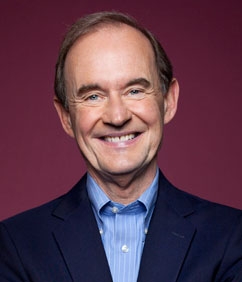Alumnus of the Month
David Boies LLM '67
Founder and Chairman
Boies, Schiller & Flexner
As a towering influence in the legal profession, David Boies LLM ’67 was the perfect choice to usher NYU graduates into their careers, delivering both the JD Convocation address and the NYU-wide Commencement address this year. Adding to a long list of remarkable achievements throughout his career, Boies also received an honorary doctorate in law during the NYU-wide Commencement.
Boies is founder and chairman of Boies, Schiller & Flexner; former partner at Cravath, Swaine & Moore; and litigator in such storied cases as Westmoreland v. CBS, United States v. Microsoft, and Bush v. Gore. At Cravath, Swaine & Moore, he successfully defended IBM from antitrust action, persuaded General William Westmoreland to drop his libel suit against CBS, and made partner by the age of 31. Boies left the firm in 1997 to start Boies, Schiller & Flexner, which counts American Express, DuPont, and NASCAR among its clients.
At the University’s 181st Commencement Exercises at Yankee Stadium on May 22, NYU President John Sexton, Law School dean emeritus and Benjamin F. Butler Professor of Law, addressed Boies as a “devoted alumnus, pivotal figure in your profession, and arguably the lawyer of the century,” and conferred upon him an honorary Doctorate of Laws.
During NYU School of Law’s 2013 Convocation on May 24, Boies stressed that reputation was the key to a fulfilling career. “If you look at the people who are successful in this profession, it is not the people who are the smartest,” he said. “It’s not even the people who work hardest. It’s the people who are most trusted. Your integrity, your credibility is your biggest asset, and when you go to court it is your biggest weapon.”
Drawing from his recent experience in defending marriage equality in Hollingsworth v. Perry, the federal constitutional challenge to California’s Proposition 8 that is awaiting ruling by the United States Supreme Court, Boies reflected on the importance of eradicating social discrimination.
“If you carry on, and if you build on what people who have gone before you have done, you can really change this country, this society, and the world. The concept of equality is baked into the American soul, but only through the law do you make that promise a reality. Only through the law did we end racial segregation. Only through the law are we going to achieve marriage equality. And only through the law means only through lawyers,” Boies said.
No stranger to discussing the subject of marriage rights before large, rapt audiences, Boies recently joined MSNBC host Rachel Maddow and fellow litigator, Theodore Olson, at NYU School of Law for an in-depth interview about the future of marriage equality.
“I think it’s easy to recognize the constitutional guarantee of the right to marry. What we now have to do is recognize that there’s no basis to discriminate based on sexual orientation,” Boies said during the discussion. “That is an argument that isn’t Republican or Democrat, conservative or liberal. It is an argument that appeals to everybody who shares the basic principle that all American do of equality under the law, justice for everybody.”
Boies has also reflected on another watershed case he was instrumental in: Bush v. Gore, the infamous Supreme Court case during which he argued on Al Gore’s behalf in 2000.
“Every lawyer is used to losing cases, but it’s tough when you lose the whole country,” Boies said, calling the defeat “particularly frustrating and disappointing” because the Florida courts had been receptive to Gore’s arguments.
He has predicted the case could have unforeseen ramifications in the future. “It could come back to haunt some of the ideological conservatives who thought it was a good idea at the time,” Boies said.
Boies had prior experience in the realm of politics as well. He served as chief counsel and staff director to both the Senate Antitrust Subcommittee and Judiciary Committee in the 1970s, and as counsel to the Federal Deposit Insurance Corporation in the 1990s. In 1997, he won the closely watched United States v. Microsoft antitrust case as the Justice Department’s special trial counsel.
That high-profile case undoubtedly helped to fuel the extraordinary growth of Boies’ three-lawyer boutique into a 240-attorney behemoth.
Despite being a formidable trial lawyer, he has confessed that he also has a fondness for teaching and scholarly work; Boies was an adjunct professor at NYU Law for six years.
“I enjoy the law,” he said. “There’s almost no aspect of it that I don’t enjoy.”


